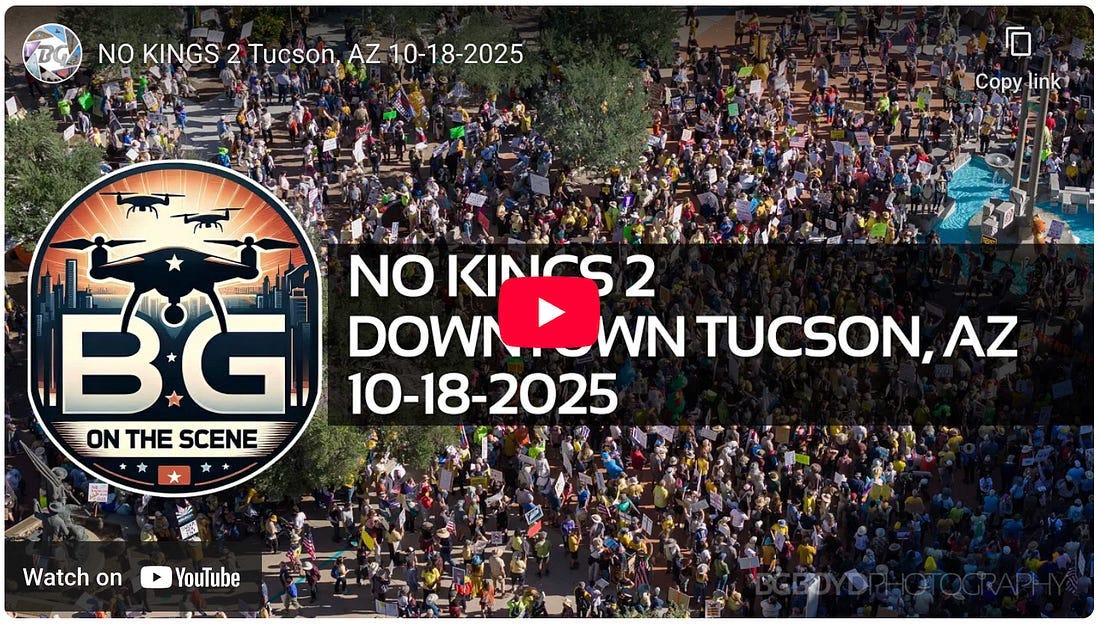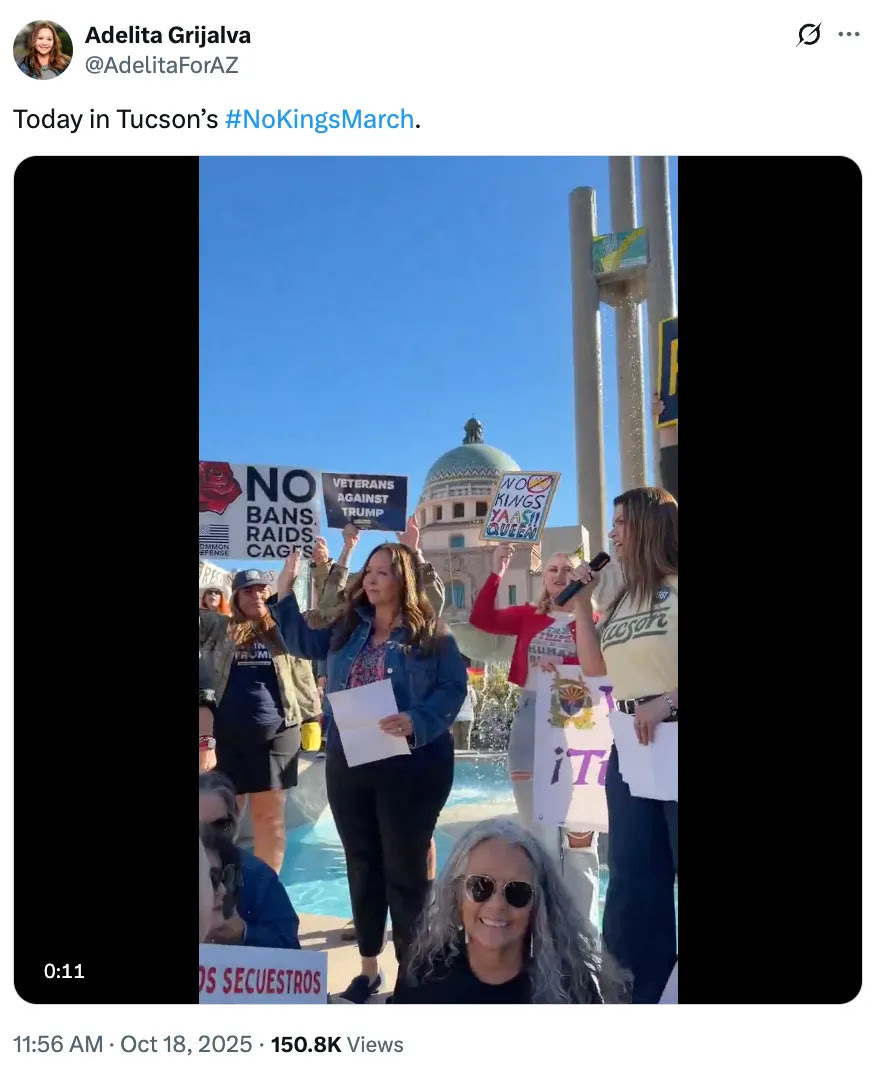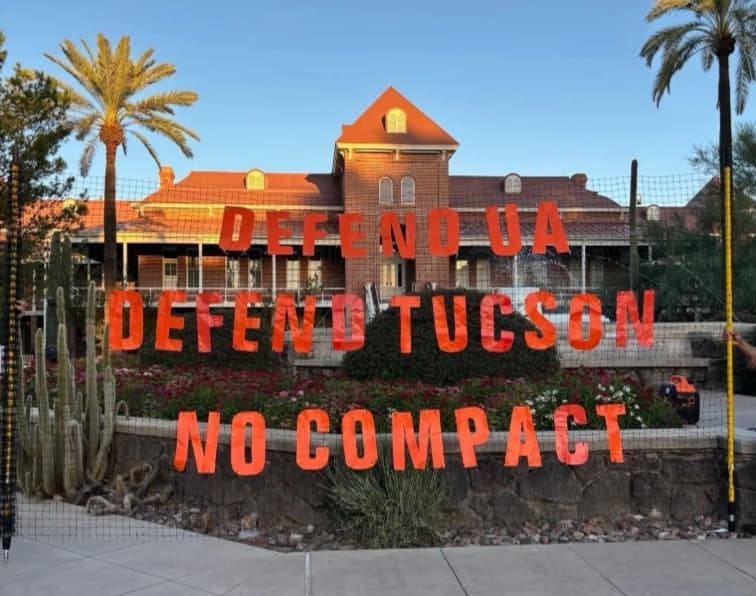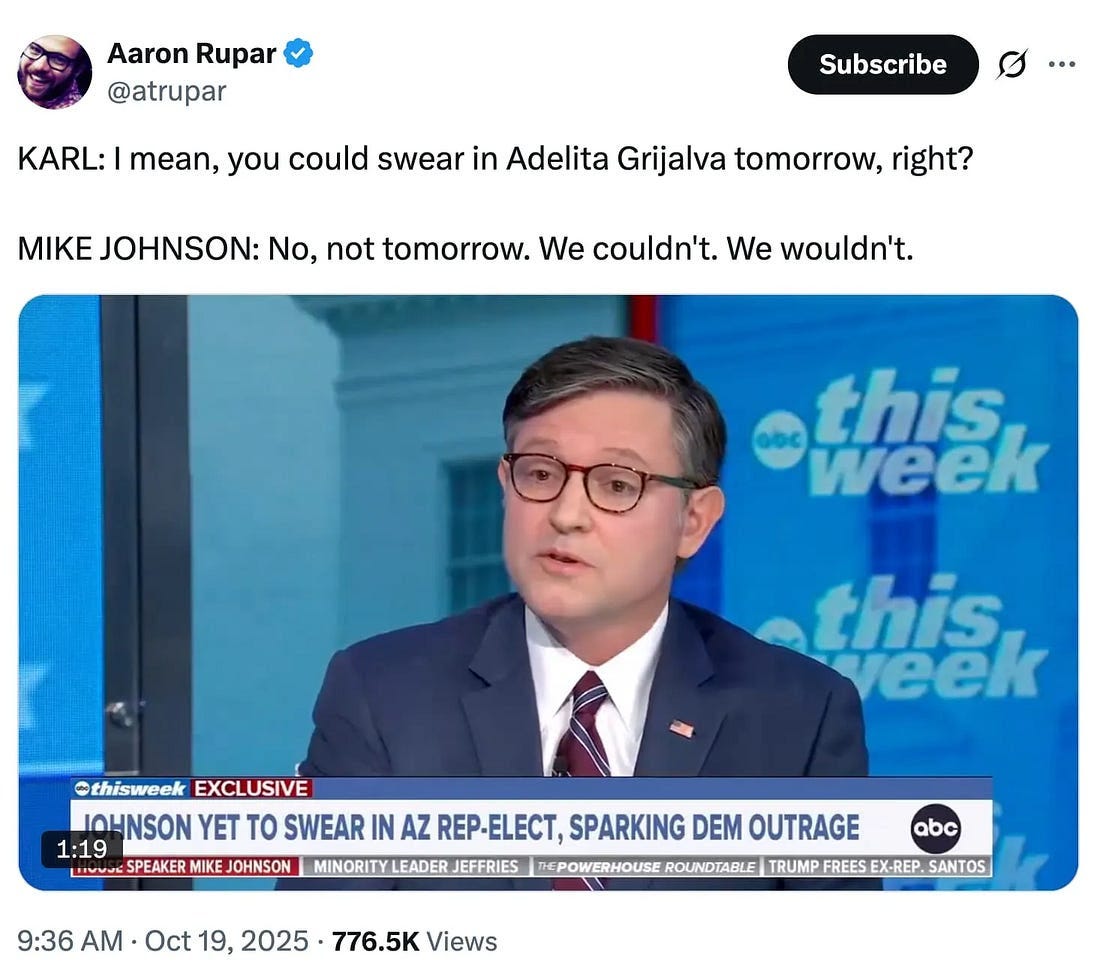The People’s Agenda
The frogs march ... UA sits on the fence ... And we would like to be paid, please.
Much to the chagrin of U.S. House Speaker Mike Johnson, who tried to brand Saturday’s “No Kings” protests as “hate America” rallies that would spill into unrest, thousands of Tucsonans defied his wish-casting by marching peacefully.
The narrative that GOP leaders have pushed, calling the protests an Antifa-backed effort, was replaced by what locals called “Amphifa”1 — a gaggle of protesters in inflatable frog costumes who joined an estimated 5,000 people carrying handmade signs, inflatable suits and colorful props at rallies in Tucson.
Thousands of others rallied across Southern Arizona, including in Oro Valley, Sahuarita, Green Valley, Vail, Arivaca, Sierra Vista and Douglas.
The Southern Arizona events were part of a much larger national protest movement, with roughly 2,600 rallies held across the country.

Here in the Old Pueblo, locals filled Presidio Plaza downtown, while thousands turned out in midtown, lining sidewalks along Speedway Boulevard for hours.
There was also a “motor march” rally, encircling the midtown protest. People who couldn’t stand for hours at a time backed up their pedestrian counterparts by driving by and honking their horns in a near-constant din supporting the No Kings rally.
While some right-wing media suggested the rallies were a precursor to violent protests, the rallies were peaceful. Tucson Police reported no arrests associated with Saturday’s protests.
Frogs take over
And it wasn’t all frogs on Saturday. People showed up in inflatable axolotls, lions, zebra unicorns, chickens, mice, and Dungeons-and-Dragons-inspired Beholder costumes.
We got the 411 on why the frogs came to protest in downtown Tucson after talking to several people in their frog costumes.
Liz spoke about her 94-year-old grandmother, who inspired her to pick up the mantle of peaceful protests, with a little bit of flair.
“She was an activist and pursuer of justice her entire life,” Liz said.
With two young kids at home, Liz said she worries about their future.
“It’s about education, right? Fascists don’t like an educated populace, and that’s what we are seeing,” Liz said.

Another frog, Mickey Miller, was concerned about his neighbors as ICE raids become more frequent across the country.
“All of my friends are Hispanic,” Miller said. “We are a liberal enclave, I like that here and so I am supporting that.”
Saturday’s protest was against the rising authoritarianism and fascism, Danielle told us, speaking in her frog costume.
“I am here for justice,” Danielle said. “I am concerned about where we are going as a nation.”
Ester grew up in a racially diverse neighborhood and worries about her neighbors.
“I mainly showed up for anti-ICE things,” Ester said. “Just because I come from an immigrant family.”
Let her in!
Saturday’s march included a new chant that’s likely unique to the city.
“Swear her in!” was repeatedly chanted throughout the Old Pueblo, including at one point right in front of Congresswoman-elect Adelita Grijalva.
Still waiting to be sworn in nearly a month after she was elected in a landslide victory, Grijalva addressed the crowd in downtown Tucson.
“What we have to do is stand up for those who cannot be here, who are afraid of this administration. People are disappearing literally off of our streets,” Grijalva said. “This administration wants to eliminate each and every one of us. We are 99 percent that they don’t care about.”
Tucson Mayor Regina Romero, a close friend of Grijalva, told the crowd not to “obey in advance” — a reference to Yale historian Timothy Snyder’s 2017 book, On Tyranny: Twenty Lessons from the Twentieth Century.
“I know fascism is happening right now,” Romero said. “It is not some theoretical question of when it is going to happen. It is happening now.”
Yet another person dressed up as a frog for the No Kings rally downtown, Heidi Harley, is upset by Johnson’s decision to repeatedly delay Grijalva’s swearing-in ceremony.
“I am outraged that they haven’t sworn in Adelita Grijalva. I think it is the central issue facing Tucson right now — we don’t have representation,” Harley said.
Saturday’s No Kings protests represented one of the largest demonstrations held locally since President Donald Trump took office in 2025.
And then there were three.
The latest tally shows six universities have rejected a compact offered by the Trump administration that would give them first dibs on federal funding in exchange for signing onto Trump’s political agenda.
Only the University of Arizona and two other schools are still on the fence, out of nine that were offered the compact at the beginning of the month.
The lack of takers spurred the White House to call the remaining universities (including reps from the UA) on Friday.
After the call, the University of Virginia rejected the deal, joining MIT, Brown, Penn, Dartmouth and the University of Southern California.
In Arizona, Gov. Katie Hobbs finally weighed in on the compact, saying it was a bad deal for the UA and certain provisions were “bordering on censorship,” Capitol scribe Howie Fischer reports.
But Hobbs said she wouldn’t use her influence as a member of the Arizona Board of Regents to try to sway the UA one way or the other.
The regents met with UA President Suresh Garimella on Friday to discuss the compact in private, the Arizona Daily Star’s Prerana Sannappanavar reports. They met for an hour, but didn’t take any action.
Elsewhere on the UA campus on Friday, 18 campus groups, including the Black Student Union, organized a rally to urge UA officials to reject the deal, the Arizona Luminaria’s Carolina Cuellar reports.
The UA and the two other remaining schools — Vanderbilt and the University of Texas-Austin — have until this afternoon to give feedback on the compact. Trump officials want deals signed by Nov. 21.
Regardless of what UA officials decide, it looks like Arizona is guaranteed to stay in the mix for a while.
The Trump administration also offered the compact to Arizona State University, along with the University of Kansas and Washington University in St. Louis, the Wall Street Journal reports.
ASU officials, who reportedly have been meeting with Trump officials for the past few weeks, are interested in making a deal on shared principles, but they’re concerned about certain issues, like the cap on international students and freezing tuition.
Majority rules: The upcoming Tucson City Council elections could give Mayor Regina Romero a trio of close allies, which would lead to a solid majority on the council and make it much easier for her to accomplish her goals, Arizona Daily Star columnist Tim Steller writes. However, Romero might not need much help, since most of the council members vote with her anyway. Meanwhile, Romero’s newest endeavor, the Safe City Initiative, was panned by some of her longtime critics at the Tucson Crime Free Coalition. The initiative “overlooks the ongoing crisis and promotes strategies that have failed,” the coalition’s Kevin Daily, Josh Jacobsen, Monica Carlson and Oliver Swan write in an op-ed in the Tucson Sentinel.
Post-Project Blues: Tucson’s director of economic initiatives, who helped usher in Project Blue, resigned late last month, the Star’s Tony Davis reports. Barbra Coffee didn’t say why she resigned, but her announcement comes after Project Blue was widely lambasted by the public, which led the council to nix it about a month ago.
Get back to your seat faster: Stop by the snack bar at Sunnyside football games if you want to see what district officials plan to do if voters approve Proposition 416, a $120 million bond measure, the Arizona Luminaria’s Shannon Conner reports. The snack bar is in dire need of repairs. There’s no air conditioning, and if you try to heat the nacho cheese and use the microwave at the same time, the power goes out.
Searching for a 10-foot pole: A former volunteer for Rep. Juan Ciscomani’s campaign was mixed up in the racist text threads among leaders of the Arizona Young Republicans, the Green Valley News reports. Rachel Hope’s involvement in the texts was mostly reacting to others’ remarks, although she did say she “loved” the idea of linking a political opponent to white supremacist groups and circulating “pro-Nazi” propaganda. Ciscomani’s office referred questions from the Green Valley News to his campaign, which didn’t call back. After not answering any questions from the press, Ciscomani used his campaign’s Twitter account to take a swipe at the press while condemning the racist rhetoric. He also said “these individuals” briefly volunteered with his campaign through an outside organization, but “no one on our team can even identify them.”
Keep the anti-Nazi propaganda flowing by clicking this button.
Preserving a legacy: Tucson officials are asking the public for comment on whether to rename Mission Manor Park after the late Congressman Raúl Grijalva, per a news release from the city. The proposal says Grijalva worked tirelessly on environmental issues and championed education, workers’ rights and health care. You can let them know what you think by filling out this comment form.
“I feel it is fitting to rename this park after him, not only because of his service, but because he spent his childhood living in the southside, spending much of his childhood at the park,” Eva Carrillo Dong wrote in the proposal. “… It was the community hub, where neighborhood Easter egg hunts were held, where birthdays were celebrated and where baseball games and practices were held most evenings.”
Sure, there were plenty of clever costumes at Saturday’s “No Kings” protest in Tucson.
But almost everyone also carried a handmade sign — sharp, funny, and often scathing in their critiques of President Trump and his administration.
The messages varied widely, but one theme kept popping up: Protesters wanted the world to know they weren’t on anyone’s payroll.
That pushback was deliberate. For years, the right has tried to dismiss these movements by claiming the crowds are padded with paid actors.
Saturday’s signs made clear that the accusation wasn’t just false — it was laughable.
That’s a play on “amphibian” and Antifa — a nod to the inflatable frog suits that went viral from Portland’s protests — in case you didn’t get the reference.








